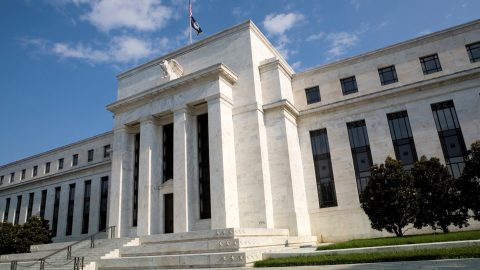All articles on the topic “Markets”
Emerging countries under pressure
Commodity prices have fallen drastically since the beginning of July. The commodity price index provided by Bloomberg has fallen by nearly 12%. In fact, many commodity prices are locked in a bear market. The index is currently almost 50% below the level of the beginning of 2011. Over the same period the currencies of emerging […]
China weighs heavy on commodity prices and production
Global GDP growth has probably only increased marginally in Q2 after the very weak Q1. Economic activity has thus remained disappointingly weak on a global scale.
Turning more positive on CEE equities
In searching for a perfect example of a sideways market one does not need to look further than at Central and Eastern European (CEE) equity markets. The CECE Composite, a Euro-based index of 23 Polish, Czech and Hungarian blue-chips (Bloomberg: CECEEUR), has been range bound for nearly four years, rarely trading outside a narrow range […]
Agreement between Iran and the P5+1 countries depresses oil price
The negotiations between Iran and the UN veto powers plus Germany were concluded successfully on Tuesday, 14 July. Iran will curtail its nuclear programme. In exchange, the international economic sanctions will be reduced. The result is remarkable in so far as the interests of the P5+1 (the five permanent members of the UN Security Council […]
Parallel currency in Greece?
Last Sunday, the Greek people decided with a clear majority to follow the proposal of their government. With 61.3%, the No camp rejected the conditions of the expired adjustment program. Thereby, Greece is one step closer to an exit from the Eurozone and the European Union.
Greece – the never ending story
The breakdown of the negotiations between Greece and its creditors as well as the planned referendum on 5 July troubles capital markets. Greece itself is formally not insolvent. As long that this is not the case the European Central Bank (ECB) will do whatever it takes to contain spillover risks. After the referendum, the next […]
Measuring Greek risk
The longest eleventh hour in recent history is drawing to a close. However, while the negotiations earlier this week seem to have narrowed the gap between Greece and its creditors, a final deal has not emerged yet.
High noon in Greece and the trend to volatility
Summary: The economic recovery in the developed economies is supported by the very expansive monetary policies, lower austerity pressure on the government front and among banks, and the fallen oil price. Growth rates remain moderate. In the emerging markets we can see signs of low-level stabilisation at best. The possible default of Greece, excessive interest […]
Is the Eurozone facing a turnaround in interest rates?
Eurozone government bonds have ensured very good performance returns in the past years. The asset class has benefited from the zero interest rate policy and the very expansive monetary policy of the European Central Bank. In recent weeks the prices of bonds from Eurozone countries have gone through a correction, above all German government bonds. […]

Could the outcome of Turkish parliamentary elections lead to increased volatility?
The upcoming parliamentary elections on Sunday in Turkey could force Erdogan to postpone his plan for a new constitution and could lead to new political leaders in the Ministry of Finance and the Ministry of Economics. This would trigger an increase in uncertainty and consequently a higher degree of volatility for the Turkish Lira and […]
Emerging markets equities: no comeback at this point
Based on earnings expectations emerging markets equities are currently valued 27% below the price/earnings ratio of developed markets equities. The long term average of this discount is 19%. Closing the gap is a question whether the confidence of the markets in the earnings expectations is solid enough to facilitate a re-(e)valuation.
Economic Growth: Is the glass a third full or two thirds empty?
Weak growth Real global economic growth was weak in Q1. Estimates put economic growth at an annualised 1.5% (q/q). Thus the long-term trend of downward revisions is intact, which keeps the fears of global economy possibly heading for persistent stagnation alive.
Changes in the market regime
The big trends of the past weeks such as the appreciation of the US dollar, the weakening oil price, falling yields, and the outperformance of Eurozone equities have reversed in the past days and weeks, in some cases drastically so. What is behind all of this? When both demand (i.e. economic growth) and supply (i.e. […]
Market and fundamentals
Weak growth Real global economic growth was surprisingly weak in Q1. The preliminary estimate for the annualised growth rate of Q4 2014 to Q1 2015 is only 1.5%. This is mainly due to disappointingly weak growth of the GDP in the USA (+0.2%), in China (+5.3%), in the UK (+1.2%), and in Japan (+1.5%; estimate). […]
Strong Dollar and Turkey
In Turkey, the impact of the currency fluctuations are being discussed and even an ordinary Turk on the street knows what it means for the currency to depreciate. For example, during a cab ride, you may have a very deep economic discussion with the taxi driver about the dollar and the Turkish lira. This is […]
China – the biggest economy in the world
The new normal The importance of China for the global economic and financial system continues to grow at a rapid pace. Last year the country set a new milestone by becoming the world’s biggest economy. The total value of goods and services produced in a year exceeds that of the United States. Thus, at 30% […]
Macro data: Dynamics down
The dynamics of the economy and the markets have declined. Global economic growth is down on a quarter-on-quarter basis, the two most important trends of the past months (appreciation of the US dollar and falling oil price) have come to a halt, inflation is not falling anymore, and the US Fed has put a damper […]
The investment segment of emerging markets corporate bonds has matured
For many institutional investors corporate bonds from emerging markets issuers have become an important instrument of portfolio diversification. Our fund management team estimates that a portfolio made up of 70% investment grade bonds and 30% high-yield bonds can yield an average 5% in the medium term. This sort of yield can hardly be achieved with […]
The confrontation of the doves
The most important central bank in the world, i.e. the US Fed, made an announcement yesterday that attracted a large deal of attention from investors. The bank withdrew its assurance to remain “patient” before the Fed funds rate would be increased. This paved the way for a possible abandonment of the zero interest rate policy, […]
Two canaries in the coalmine
The US dollar has appreciated significantly vis-à-vis the euro in the past months. For this trend to continue, at least two developments would have to be in place. Firstly, the US Fed would have to abandon its zero interest rate policy; and secondly, the ECB would have to remain on its path of negative interest […]
Boon and bane
The driving topics on the financial markets are the stabilisation of the oil price, mixed economic indicators globally vs. positive economic indicators for the Eurozone, the temporary decline in escalation risk, and the expansive central bank policies.
What has become of the “oil x 20” rule?
The oil and gas sector is the backbone of the Russian economy. It contributes roughly a quarter to the Russian GDP, and it accounts for almost two thirds of exports. Oil and gas companies represent almost 60% of the market capitalisation of the Moscow stock exchange. It therefore makes sense to analyse the performance of […]
The effects of the ECB policy
Since the cutting of key-lending rates to almost zero in the Eurozone did not suffice to keep the inflation expectations at their long-term target of slightly below 2%, the ECB Council decided in January to expand the central bank money supply until the accomplishment of the target was foreseeable. The possible effect on the financial […]
Light and shadow
The environment has become a bit brighter in the past weeks. In addition to the improvement of the economic environment in the Eurozone and Japan, more and more central banks loosened their monetary policies. For example, on 12 February the central bank of Sweden (Riksbank) surprisingly cut its key-lending rate to -0.1% and announced to […]






















